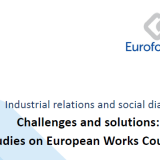
Agreements
Agreements are the outcome of collective bargaining and social dialogue processes. Social partners are encouraged to negotiate and conclude collective agreements that can then be implemented at European, national, regional, sectoral or company level. Increasingly Union labour laws are shaped by agreements that the parties voluntarily enter into and by soft law mechanisms.














